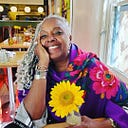From Brazil With Love: The Power & Oppression of Black Brazilian Women, Pt1
Dear Reader,
I recently discovered that in Portuguese the word, Irmã, means “sister.” It is the same way that my name is spelled. And, I’d like to think they are connected since my trip to Brazil was a journey of sisterhood — both within my travel group and with the Afro-Brazilian women we encountered formally and informally.
Over the course of one week (Aug 16–24, 2023), a group of Black American women, ranging in age from 20 to 82 years old, met with their Black Brazilian women counterparts through the Brazil Cultural Immersion Experience (BCIE).
This trip (a gathering of Black American women) was the brainchild of two young Black women of faith — one Afro-Palestinian (Azmera Hammouri-Davis,MTS) and the other Black American (Danielle Ayers). And, it was questions of faith and spirituality that guided the BCIE cultural journey as we navigated our way through a different language (Portuguese), unique culinary delights (Acarajé and Moqueca), and a diversity of Black Brazilian women’s groups — both spiritual and secular. We learned a lot, up close and personal, about the power and oppression of Black Brazilian women historically, and in the present.
These cultural encounters were organized by Rita (pronounced Hita), a local guide of Abayomitur, accompanied by Felipe Nunes, our translator (ING: @mr.felipenunes), supported by the trip’s co-leader Azmera. On occasion, Insight News’ Afrodescendentes editor and Brazil correspondent, Yoji Senna (ING: @menstrasenna), also helped with translation.
The Many Faces of Afro-Brazilian Women
Over an intense 10-day journey, the BCIE met with Afro-Brazilian women from all walks of life; we suspended our cultural judgments, and opened ourselves up to new knowledge, aiming to understand how Afro-Brazilian women’s faith and spirituality guide their lives. An authentic Brazil cultural immersion experience for us, and a chance for Afro-Brazilian women to meet their USA African-descended counterparts up close and personal.
Brazil is a Black Country
Few people, including Black Americans, realize that the country of Brazil is larger than the entire United States. According to the World Atlas, “…Brazil is larger than the contiguous US by approximately 300,000 square miles…[since] about 685, 924 square miles of the US is covered by water compared to only 21, 444 square miles of Brazil.
Also, under Portugal’s colonialist enterprise, Brazil received the largest number of African slaves. Thus, its contemporary population is comprised of people with over 50 percent African ancestry. The Minority Rights Group says, “An estimated 91 million Brazilians are of African ancestry, according to the 2010 census, which found that more than half (50.7 percent) of the Brazilian population now identified as preto (black) or pardo (mixed ethnicity).”
This contrasts sharply with Black Americans; we are only 12 percent of the US population. A recent Pew Research Report indicates 47.2 million people self-identified as Black (https://www.pewresearch.org/short-reads/2023/02/10/key-facts-about-black-americans/). However, this increase in the number of Black Americans, since 2000, is due to the inclusion of Blacks born in other countries or whose parents’ ancestry is outside the US — Africa, the Caribbean, and Latin America primarily.
Thus, Brazil is known to have the largest population of people of African ancestry (Afrodescendentes) in the Americas, and second in the world only to Nigeria, which has the largest population of Black people in the world in terms of sheer numbers (224 million), and continues to grow. Whereas the entire US population is 330 million today, by 2047, Nigeria is expected to surpass the US in population (https://worldpopulationreview.com/countries/nigeria-population ).
From Brazil with Love,
© 2023 Irma McClaurin
Irma McClaurin (https://linktr.ee/dr.irma/ @mcclaurintweets) is the Culture and Education Editor for Insight News and founder of the Irma McClaurin Black Feminist Archive at UMass. An activist Black Feminist anthropologist, she is a past president of Shaw University, founding Executive Director of the University of Minnesota’s UROC, and has held numerous other leadership positions. McClaurin completed the MFA in English and PhD in Anthropology from the University of Massachusetts Amherst, and in 2023 was awarded the Honorary Doctorate of Social Studies by her alma mater, Grinnell College. Her book Black Feminist Anthropology: Theory, Politics, Praxis and Poetics was named an “Outstanding Academic Title” in 2002 and the Black Press of America selected her as “Best in the Nation Columnist” in 2015. She is a consultant and coach and is on the Advisory Board of the newly established Center for Diaspora and Migration Studies (CDMS) at the University of Liberia. A collection of her columns, Justspeak: Reflections on Race, Culture & Politics in America, is forthcoming in 2023.

